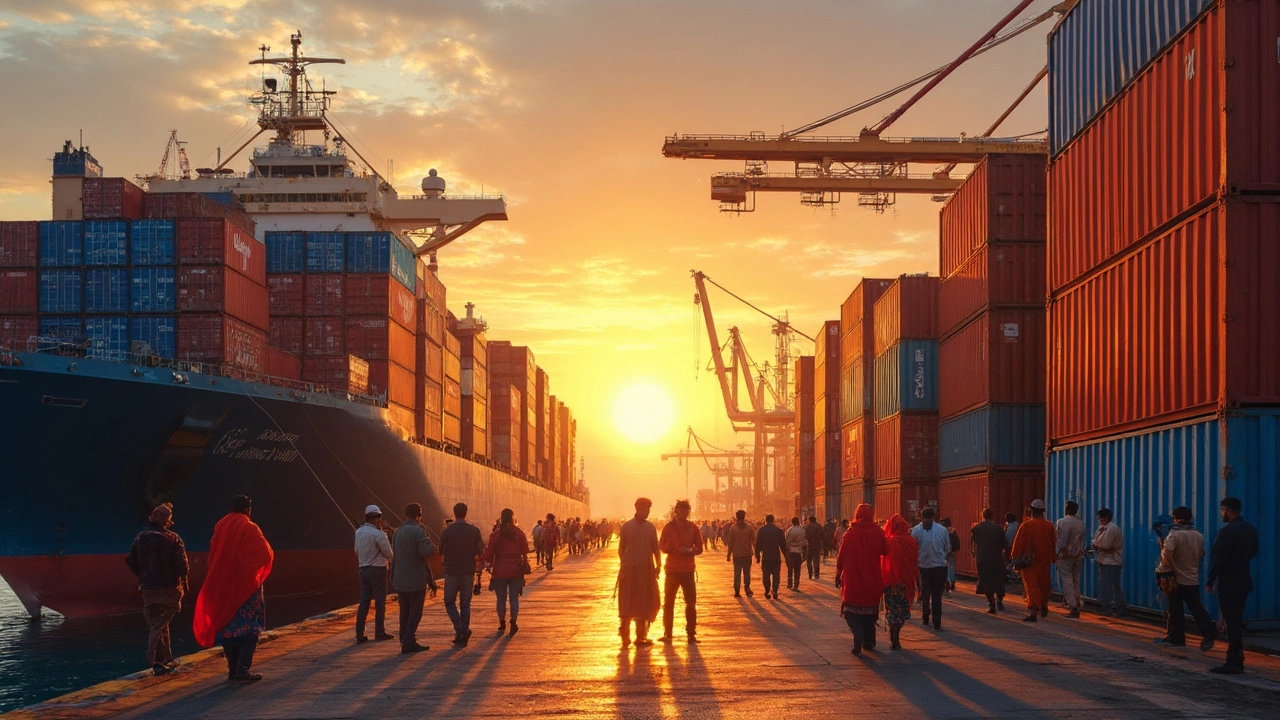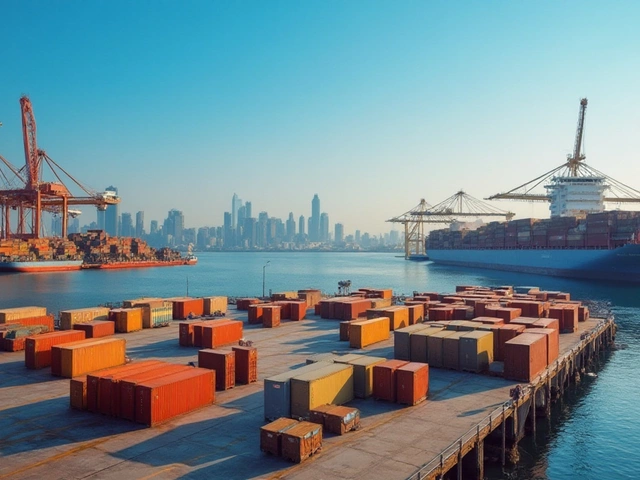Freight forwarding might sound fancy, but it’s really all about getting your stuff from point A to point B, especially across borders. Ever wonder who actually foots the bill for this service? That’s what we’re diving into.
First off, let's lay the groundwork. A freight forwarder takes on the heavy lifting of organizing the transport of goods. It’s their job to deal with customs paperwork, find the best routes, and sometimes even store your goods until they’re ready to ship again.
Now, those services aren’t free. Typically, it’s the shipper or the consignee (meaning the buyer or the seller) who covers these costs. But it’s not always cut and dry—contracts and agreements can change who's paying and when. Understanding these details can help avoid headaches and unexpected bills.
Think of freight forwarders as the middlemen making trade smoother and less stressful. Knowing how and why they charge can save you some cash. Let’s get into the nitty-gritty, shall we?
- The Role of a Freight Forwarder
- Breaking Down the Costs
- Who Typically Pays?
- Tips for Reducing Costs
- Common Misconceptions
- Final Thoughts
The Role of a Freight Forwarder
Alright, let's peel back the curtain on what a freight forwarder actually does. Think of them as the ultimate logistics problem-solvers. They're like a cross between a travel agent and a logistics manager for your goods. Their job? Make sure everything gets where it needs to go smoothly.
Handling the Paperwork
First on their to-do list is dealing with the endless pile of documents. We're talking bills of lading, export declarations, and customs paperwork. It’s mind-numbing work that requires precision, and it's vital for keeping goods moving across borders without hitches.
Finding the Best Route
Next up, they find the sweet spot between cost, speed, and safety for transporting your goods. That could mean choosing a mix of sea, air, rail, and road. They're seasoned pros at predicting potential snags like port congestion or bad weather, and they plan the routes accordingly.
Coordinating with Carriers
Freight forwarders are in constant contact with carriers. They negotiate contracts, determine shipping lanes, and schedule pickups and deliveries. Think of it as lining up the pinballs in a pinball machine; they make sure everything is in place so your shipments don’t get stuck bouncing around.
Providing Value-Added Services
And there’s more! Many freight forwarders offer additional perks like storage options, cargo insurance, and even help with packaging. Some might suggest consolidation, where they pack goods from multiple shippers into one container to cut costs. That’s value for your dollar.
Understanding the role of a freight forwarder can totally change the way you approach your shipping process. Whether it’s about saving money, time, or just lowering stress, knowing what these logistics gurus do can be a real game changer.
Breaking Down the Costs
Understanding the costs of a freight forwarder can feel like unraveling a complex puzzle. But don’t worry, we’ll piece it together.
Types of Costs Involved
When dealing with a freight forwarder, costs can vary depending on the services they provide. Here are some common expenses:
- Shipping Fees: These cover the actual movement of goods – whether by sea, air, or land. It's the big chunk of the bill.
- Documentation Fees: Freight forwarders handle loads of paperwork. They ensure your goods comply with the regulations.
- Handling Fees: These cover the loading and unloading of goods at various transit points.
- Insurance Costs: They offer peace of mind should things go wrong, and are well worth considering.
- Customs Clearance Fees: Forwarders act as liaisons with customs, smoothing out all the additional duties.
Variables Affecting Costs
Several factors can affect these costs:
- Shipping Volume: More goods typically mean lower costs per unit, thanks to economies of scale.
- Distance and Route: Longer distances can rack up the price, and certain routes might be more expensive due to the demand or geopolitical concerns.
- Time of Shipment: Prices might go up during peak seasons or unexpected delays can add costs.
Sample Cost Analysis
Just to give you an idea, here’s a basic table illustrating potential costs for different modes of transport:
| Mode of Transport | Average Cost per Ton |
|---|---|
| Sea Freight | $50 |
| Air Freight | $500 |
| Land Transport | $100 |
Keep in mind that these are rough estimates. Actual costs can swing wildly based on market conditions or special requirements you may have.
Understanding these components can help you navigate and negotiate smarter deals with your logistics partners. Keeping an eye on these expenses means fewer surprises and better budget planning. It’s all part of making the shipping process smoother and more cost-effective.
Who Typically Pays?
When it comes to figuring out who pays a freight forwarder, it's all about who the goods are being shipped to and from. Normally, either the buyer or the seller will take on the costs, and this is usually laid out in a shipping agreement or contract.
Incoterms – have you heard of these? They're pretty much the go-to guide for determining shipping responsibilities and costs in international trade. Depending on the incoterm used, either the buyer or the seller might end up with the tab.
Looking at Incoterms
If you’re squirreling goods away as a seller under terms like FOB (Free on Board), you'll cover costs until the goods are loaded onto the ship, and then the buyer is up. On the flip side, if it's CIF (Cost, Insurance, Freight), the seller will usually foot the bill for all charges up to the destination port.
- FOB means the buyer pays the freight forwarder once the goods are on the ship.
- CIF involves the seller paying until the goods reach the destination port.
Exceptions to Consider
There are exceptions though. Let's say you're dealing with a good customer on the buyer's side and you want to sweeten the deal – sometimes sellers opt to cover these charges as a nice gesture. Plus, in some industries, it’s just part of getting the job done smoothly.
Looking at what's common, it's often part of the negotiation dance in bigger international deals. So, next time you’re looking at a freight deal, pay attention to those terms – they’re not just fine print. Knowing who covers the freight forwarder costs can keep your budget on track and your business relationships in good shape.

Tips for Reducing Costs
Trying to save some bucks when dealing with freight forwarder costs? It’s not as hard as you might think. Here are some practical strategies you can consider.
Negotiate Your Contracts
When it comes to shipping costs, everything is negotiable. Don’t just take the first offer you get. Talk with your freight forwarder and see if there’s room for discounts or better terms. Building a good relationship can lead to perks like volume discounts or priority processing.
Plan Ahead
Rushing to get things shipped at the last minute can add unnecessary costs. Always aim to plan your shipments well in advance. This not only saves money but also gives you time to find the best rates and options.
Combine Shipments
If you’re regularly shipping goods, consider consolidating multiple shipments into one. This can often reduce costs and make logistics simpler. Plus, it’s more eco-friendly, which is always a plus.
Understand Incoterms
Incoterms are basically the rules around who pays for what during shipping. Knowing these can prevent surprise expenses. Make sure you comprehend any terms you’re working with and how they affect who foots the bill.
Use Digital Solutions
Leverage technology to track shipments and manage logistics. Digital tools can help you pinpoint where costs are ballooning and where you can trim the fat.
Shop Around
It pays to take a look at what different forwarders are offering. Prices and services can vary greatly, so getting multiple quotes is a wise move to ensure you’re getting the best deal.
Leverage Long-term Partnerships
Sticking with a freight forwarder over time can sometimes lead to increased benefits and reduced rates. As you become a better customer, forwarders might be more inclined to offer you better deals.
Here’s a little nugget of info: A study showed that businesses that strategically plan their shipping saved up to 15% on logistics costs. You can dive into those kinds of savings with a bit of foresight and these tips in your back pocket.
Common Misconceptions
When it comes to freight forwarding, there's no shortage of myths floating around. Some of these can make people wary of using a freight forwarder—which is a shame since they’re often unfounded. Let's clear up a few of the big ones.
Misconception 1: Freight Forwarders Are Just Middlemen
While it's true that they connect shippers to their destination, calling them just middlemen does a disservice to the expertise they bring to the table. A freight forwarder doesn't just arrange transport; they solve logistics issues, handle customs, and even sometimes consolidate shipments to save cost.
Misconception 2: They're Too Expensive
Many worry that hiring a freight forwarder will break the bank, but in reality, they often save money. They have the industry know-how to find the most cost-effective and reliable shipping routes and options, potentially cutting down your shipping costs.
Misconception 3: You Can Easily Do It Yourself
Sure, you could attempt to handle all the logistics and paperwork, but do you really want to? Think of the massive amount of time spent on documentation and the headaches that come with navigating international shipping rules. The peace of mind and efficiency a skilled freight forwarder provides is hard to beat.
Misconception 4: They Only Handle Big Shipments
It’s a common thought that only big players need freight forwarding services. But no matter the size, from individual packages to full container loads, a freight forwarder can tailor their services to fit your needs and budget.
Understanding these misconceptions helps make more informed decisions when it comes to shipping. Don't let myths keep you from utilizing these logistics pros to their full potential.
Final Thoughts
Wrapping up this whole freight forwarding contemplation, it’s clear there’s more to it than just making sure packages show up on time. Knowing who pays a freight forwarder isn’t always straightforward, but a little understanding can save a ton of hassle. Freight forwarding is essential in international trade, providing critical logistical support that can literally make or break how smoothly your goods travel across the globe.
What to Keep in Mind
First, always nail down the details of payment beforehand. Whether you’re the shipper or the consignee, clarity in financial responsibilities in your logistics agreements can help avoid unwelcome surprises down the road.
- Shipping costs and other associated fees can vary, so shop around and compare.
- Communicate clearly with your forwarder about your needs to get an accurate idea of what you’ll be billed for.
It can be tempting to overlook these expenses, but they’re key to budgeting correctly and ensuring a smooth process from start to finish.
Understand the Value
The correct logistics partner not only ensures timely delivery but adds value by handling complexities like customs paperwork and legal requirements you might not even be aware of. The price you pay includes peace of mind—which can be priceless when dealing with global shipping.
What's Next?
Now that you have a grasp on who might be paying and why, it’s worth taking a deeper dive into optimizing these costs. Whether through negotiating better terms, understanding document handling, or leveraging technology, smarter logistics can lead to better profit margins.
Dig deeper into understanding your own logistics needs, whether it’s keeping track of logistics fees, knowing when to pay for expedited services, or just better aligning with your business objectives. This knowledge opens up pathways for saving money—which, when it comes down to it, is what keeps the engine running.





